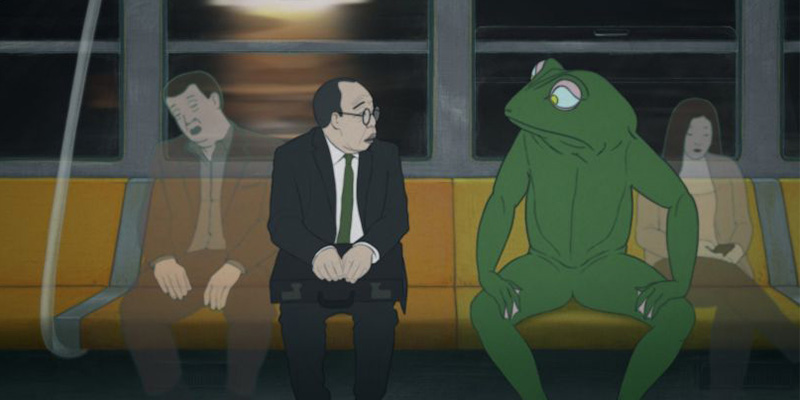Even before it begins, Blind Willow, Sleeping Woman, the new film from the French director Pierre Földes, promises to do something rather groundbreaking. It takes its title from Haruki Murakami’s short story collection of the same name, but it actually adapts six stories from the collections Blind Willow, Sleeping Woman, after the quake, and The Elephant Vanishes, braiding them all together into a single, magical narrative about three people processing the trauma of the 2011 Tōhoku earthquake.
Komura (Ryan Bommarito) is a bored bank employee unsure what to do after his wife Kyoko (Shoshana Wilder) begins to unrave, watching news coverage of the earthquake devastation all day and all night. Elsewhere, a friendless debt collector Katagiri (Marcello Arroyo) returns home one day after a foreboding news at work to find a giant talking frog (Földes himself) waiting for him, explaining his plans to save Tokyo from another seismic disaster—caused by the movements of a giant worm living underneath the city. Frog, as the frog is named, offers to fix Katagiri’s work problems if he agrees to help. Despite his misgivings, he agrees.
The film, which was animated using motion-capture technology and tracing, is a spooky, spectral, thoroughly unsettling experience. Its unnerving visuals and stilted tone cast a spell, conjures a thoughtful examination of the nature of humanity. It focuses on the everyday experiences that alienate us from others like us, and the uncanny ones that show us who we are and what we want. It is a movie about wanting to identify with others across a divide, wanting to mean something to the world. Watching it, I felt unlaced by the aches of its displaced, estranged characters. Several moments (particularly, one of Katagiri’s bad dreams) made me shiver.
There is perhaps no writer in the world more masterful at summoning and kneading dread and uncertainty, and Földes’ film, both spooky and heartbreaking, is nothing if not effective at capturing these tones. Murakami’s stories wander into the ethereal, the unexplainable, the eerie. His stories palpitate with longing, with loneliness, with a unique melancholy. If his tales have heretofore seen un-adaptable, then Földes’s film is a clear triumph for how seamlessly it recalls the dynamics of the stories it borrows from.
The film unfolds across seven chapters, as its protagonists float through their daily slogs, slowly internalizing that nothing matters even while everything feels like it’s falling apart. It is ultimately a story of how we cope with tragedy, disaster, failure, and our own individual unimportance, and so it rips with pain and wrestles with numbness in turn, with its characters finding hope and meaning in dreams and visions and watching those things dissolve in the clear light of day.
I will say that the film, though impressive for its ability to understand Murakami, might display its investment in that canon’s diaphanous despair a bit too heavily; the starkness, balefulness of the drawing style gives the film a distressing quality that gradually wore on me, exhausted me across the film’s 1h 48m runtime. The aesthetic is indeed effective in conveying the film’s thematic concerns, but the artistry of the visuals (even at their most peaceful), does not provide enough of a counterpoint, does not compliment the film’s heavy forlornness the way that Murakami’s prose does for his own morose and otherworldly vibes.
Because it lacks an entrancing, bewitching imageable language, I wonder if those who have not read Murakami will find the experience of watching the film a bit too taxing, a bit gutting or overwhelmingly existential. (I should add that this does not mean the film is not enchanting—especially in its vignettes about Katagiri and Frog, who have a charming friendship, it has moments of sweetness.)
Still, Blind Willow, Sleeping Woman is a masterly achievement. In its adapting several Murakami stories, it close-reads and places them in conversation with one another, comparing and contrasting them throughout the narrative but still entwining them into a coherent thing of their own (if you want a correlative, its kind of what the musical Guys and Dolls does with the short stories of Damon Runyon). It is a pensive, wistful film that wants humanity to be all right even though it knows better.
_________________________________
A consummate artist, Pierre Földes is a director, composer, and painter. Pierre grew up in Paris where he studied piano and composition. He began his career in New York composing music for film and advertising before moving to Europe. Fascinated by drawing and animation, he has written and directed several short films by adapting a production pipeline to his idea of film. He has thus developed his own unique and personal style and technique.
Get up to two discounted $11 tickets to the first week of screenings to Blind Willow, Sleeping Woman (regular $15) by entering promo code LITHUB at checkout.
